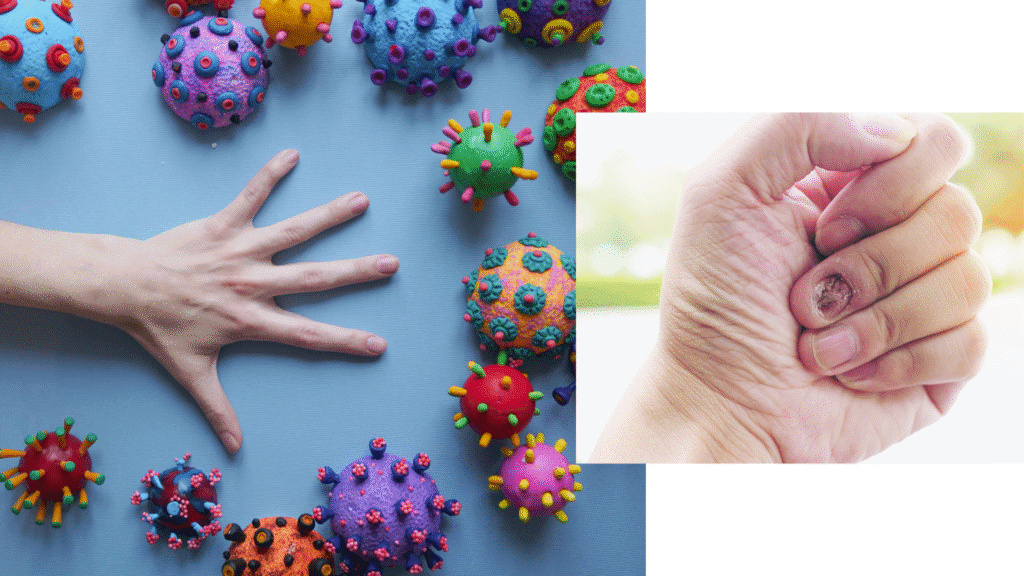
Introduction: Fungal Infections Are More Common Than You Think
With the arrival of monsoon and humid conditions, fungal infections become more frequent. Sweat, moisture, and poor hygiene can create the perfect environment for fungal growth on the skin.
But here’s the good news — if you identify the signs early, you can treat fungal infections effectively using Ayurvedic remedies that heal without side effects.
At SkinHeal Solutions, we provide expert Ayurvedic care for chronic and recurring fungal infections using natural, root-cause-based treatments.
Common Fungal Infections You Should Know
Ringworm (Tinea)
Candidiasis (Yeast infection)
Athlete’s Foot
Jock Itch
Scalp Fungal Infections (Tinea Capitis)
Nail Fungal Infection (Onychomycosis)
How to Identify Fungal Infections Early?
Watch for these early warning signs:
1. Itchy, Red or Scaly Patches
Circular or oval shape (especially in ringworm)
Often spreads if scratched
2. Recurring Infection in the Same Area
If you notice repeated rashes or patches in underarms, groin, thighs, or feet
3. Sweating or Damp Skin That Doesn’t Dry Easily
Common in skin folds and feet during humid weather
4. Burning Sensation or Mild Pain
Skin may feel tender or hot to touch
5. Discoloration or Peeling of Skin or Nails
White or yellow patches on nails or flaky skin around toes
Causes of Fungal Infections (Ayurvedic Perspective)
In Ayurveda, fungal infections are often caused by an imbalance of Kapha and Pitta doshas, along with accumulation of toxins (Ama). Warm, moist environments increase Kapha, which allows fungal organisms (Krimi) to thrive.
Natural Ayurvedic Remedies to Treat Fungal Infections
1. Neem (Azadirachta indica)
A powerful antifungal, antibacterial, and blood purifier.
Use:
Apply neem paste or neem oil on affected areas
Drink neem water (under expert supervision)
2. Triphala Powder
Cleanses the digestive system and flushes out toxins that lead to skin disorders.
Use:
Consume 1 tsp of Triphala powder with warm water at night
3. Turmeric (Haldi) Paste
Turmeric contains curcumin, which is antifungal and anti-inflammatory.
Use:
Mix turmeric powder with aloe vera or coconut oil
Apply on rashes twice daily
4. Gandhak Rasayan (Purified Sulphur)
An ancient Ayurvedic formulation to treat skin infections.
Use:
Taken internally under supervision of an Ayurvedic doctor
Purifies blood and prevents recurrence of fungal infections
5. Ayurvedic Oils (Nalpamaradi, Jatyadi)
These oils soothe irritated skin, reduce redness, and have antimicrobial properties.
Use:
Apply twice daily after cleaning the skin
Helps heal infected skin faster
Diet & Lifestyle Tips to Prevent Fungal Infections
Avoid fermented, oily, and sugary foods
Include bitter foods like neem, methi (fenugreek), and turmeric
Keep skin dry and wear loose, breathable cotton clothes
Bathe with antifungal Ayurvedic powders or herbal soaps
Get daily sunlight to dry damp skin folds
When to See a Specialist?
If your fungal infection:
Keeps coming back
Spreads quickly
Does not heal with home remedies

Why Choose SkinHeal Solutions?




Final Thoughts
Fungal infections may seem minor at first but can become stubborn and chronic without timely care. Ayurveda offers a holistic, side-effect-free way to treat and prevent fungal infections by strengthening your body’s natural defense.
Book Your Ayurvedic Consultation Today




 Avoid fermented, oily, and sugary foods
Avoid fermented, oily, and sugary foods Keep skin dry and wear loose, breathable cotton clothes
Keep skin dry and wear loose, breathable cotton clothes Bathe with antifungal Ayurvedic powders or herbal soaps
Bathe with antifungal Ayurvedic powders or herbal soaps Get daily sunlight to dry damp skin folds
Get daily sunlight to dry damp skin folds